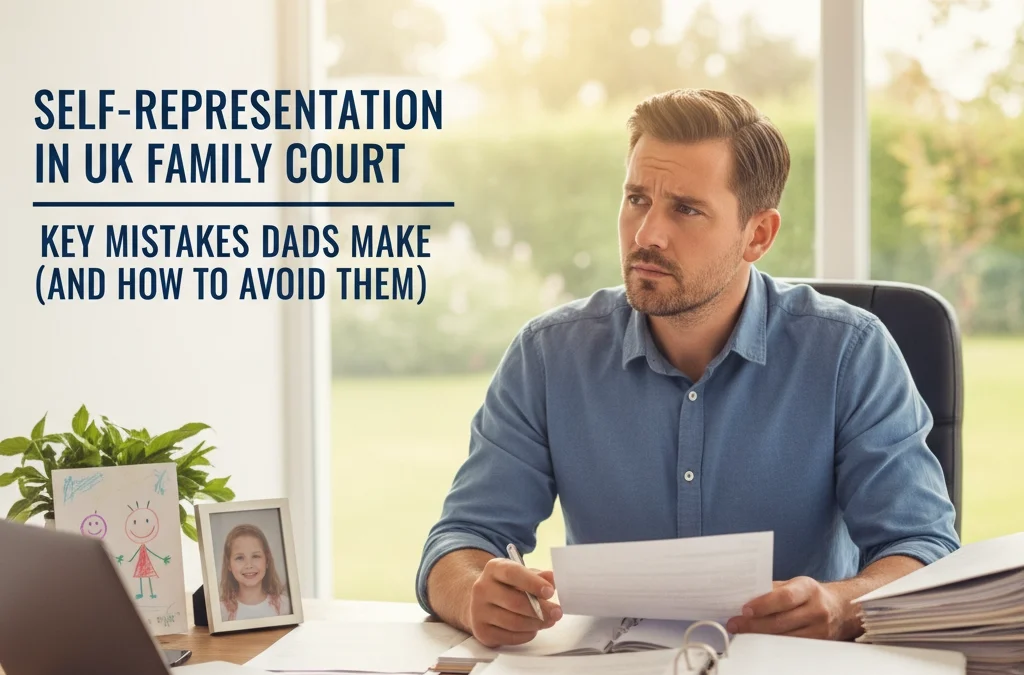Every Dad Matters. When you're facing the daunting prospect of representing yourself in UK family court, you're not alone in this journey. Thousands of fathers across the UK are stepping into courtrooms without legal representation, armed with nothing but determination to fight for their children. While the path ahead may seem overwhelming, understanding the common pitfalls and learning how to navigate them effectively can transform your approach and dramatically improve your outcomes.
Fathers United. Rights Respected. – this isn't just our motto; it's the foundation upon which we build stronger cases and better futures for our children.
The Hard Truth About UK Family Courts
Let's start with the reality check that many dads struggle to accept: you don't have rights in the traditional sense you might expect. The Children Act makes it crystal clear – the child's welfare is the court's paramount consideration, not your parental rights or feelings. This applies equally to mothers and fathers, but understanding this fundamental shift in perspective is crucial for your success.
The family court isn't there for you – it's there for your children. Once you grasp this concept, everything changes. Your entire approach, your arguments, your evidence, and your behavior must center around one question: "What's best for my child?"
Many fathers enter court believing they can rely on Article 8 of the European Human Rights Convention regarding family relationships. The harsh reality? Judges typically dismiss this approach, stating these rights have already been factored into their decision-making process. Don't waste precious court time on arguments that won't move the needle.

Mistake #1: Fighting Allegations Instead of Building Your Case
This is the big one. We see it happen repeatedly – fathers spend their entire hearing trying to refute accusations made by their ex-partner. While these allegations might feel like personal attacks demanding immediate defense, this approach typically backfires spectacularly.
Here's what happens when you fall into this trap:
- You appear combative and focused on conflict rather than solutions
- You miss opportunities to showcase your strengths as a parent
- The court sees you as part of the problem, not the solution
- Your children's needs get lost in the battle
The winning approach: Acknowledge serious allegations briefly if absolutely necessary, then immediately redirect to your parenting plan and how it serves your children's best interests. Show the court you're solution-focused, not conflict-driven.
Mistake #2: Complaining About System Bias
Yes, the system has its challenges. Yes, fathers often face an uphill battle. But here's the empowering truth: the system is what it is, and everything will proceed through a set process regardless of how much you complain about it.
Energy spent lamenting unfairness is energy not spent building a bulletproof case for your children. Channel that frustration into preparation, documentation, and strategic thinking. The court doesn't care about your feelings about the system – they care about your children's future.
Mistake #3: Poor Preparation and Documentation
Walking into court unprepared is like bringing a knife to a gunfight. Without proper legal representation, the entire burden of presenting a clear, compelling case falls on your shoulders. This isn't just about showing up – it's about mastering the art of legal presentation.
Your preparation checklist:
- Draft a comprehensive position statement
- Organize all documentation chronologically
- Prepare clear, child-focused proposals
- Practice emotional regulation techniques
- Research relevant case law and guidelines

The Power of the Position Statement
This document can make or break your case. A well-crafted position statement is your opportunity to tell your story clearly and persuasively. It should outline your situation, your proposals, and most importantly, how your requests serve your children's best interests.
Essential elements of a winning position statement:
- Clear, factual background without emotional language
- Specific proposals for contact arrangements
- Evidence of your parenting capabilities
- Acknowledgment of any legitimate concerns
- Child-focused reasoning for all requests
Remember, judges read dozens of these statements. Make yours stand out through clarity, professionalism, and unwavering focus on your children's welfare.
Navigating Parental Alienation
When your ex-partner is manipulating your children against you, it feels like the ultimate betrayal. Parental alienation is real, and CAFCASS is trained to identify it. However, throwing around accusations without evidence will damage your credibility.
Building a parental alienation case:
- Document specific instances with dates and details
- Focus on the impact on your children, not your hurt feelings
- Propose solutions that prioritize therapeutic intervention
- Avoid inflammatory language about your ex-partner
- Let the evidence speak for itself

The Emotional Minefield
Your emotions are your biggest enemy in court. We get it – you're angry, hurt, and frustrated. These feelings are completely valid and natural. But allowing them to dominate your courtroom behavior will destroy your case faster than any allegation.
Mastering emotional control:
- Practice deep breathing techniques before and during proceedings
- Prepare standard responses to provocative statements
- Focus on your children when you feel anger rising
- Take notes instead of reacting immediately
- Remember that staying calm demonstrates your fitness as a parent
Documentation: Your Secret Weapon
Everything needs to be documented, everything. In family court, if it's not written down, it didn't happen. Your documentation strategy should be comprehensive, organized, and focused on facts rather than interpretations.
What to document:
- All communications with your ex-partner
- Every interaction with your children
- Missed contact sessions and the reasons given
- Evidence of your involvement in your children's lives
- Any concerning behavior affecting the children
- Your efforts to maintain and improve the situation
Understanding CAFCASS and Court Processes
CAFCASS officers play a crucial role in family court proceedings. They're there to represent your children's interests, not to take sides. Building a positive relationship with CAFCASS can significantly impact your case outcomes.
Working effectively with CAFCASS:
- Be honest and transparent about any issues
- Demonstrate your commitment to your children's welfare
- Show willingness to work with their recommendations
- Provide clear evidence of your parenting capabilities
- Respect their professional expertise while advocating for your position
The Mediation Alternative
Before rushing to court, explore mediation options. Many disputes can be resolved more effectively, quickly, and affordably outside the courtroom. Mediation also demonstrates to the court that you're willing to work collaboratively for your children's benefit.
Benefits of mediation:
- Less adversarial than court proceedings
- Faster resolution of disputes
- More control over outcomes
- Reduced costs and stress
- Better long-term co-parenting relationships

Professional Support Options
Even when representing yourself, you don't have to go it alone. Every Dad Matters, and that means accessing the support available to you:
McKenzie Friends: Non-lawyer supporters who can attend court with you, take notes, and provide moral support.
Limited Legal Advice: Many solicitors offer unbundled services, providing specific advice without full representation.
Support Groups: Connect with other fathers going through similar experiences for practical advice and emotional support.
Building Your Case Strategy
Your case isn't just about what happened – it's about what should happen next. Courts want to see forward-thinking parents who prioritize stability and consistency for their children.
Strategic elements to emphasize:
- Your commitment to your children's education and development
- Your ability to co-parent effectively when possible
- Your understanding of your children's needs and interests
- Your willingness to facilitate their relationship with their mother
- Your long-term vision for their wellbeing
The Final Word on Self-Representation Success
Fathers United. Rights Respected. – this means standing together, sharing knowledge, and empowering each other to navigate these challenging waters effectively. Self-representation in UK family court isn't easy, but it's absolutely achievable when you approach it strategically and with the right mindset.
Remember, this isn't about winning or losing – it's about securing the best possible future for your children. By avoiding these common mistakes and adopting a child-focused, solution-oriented approach, you're positioning yourself for success in court and, more importantly, in your ongoing relationship with your children.
Every Dad Matters. Your children need you, and with the right approach, preparation, and mindset, you can successfully represent yourself and achieve outcomes that serve your family's best interests. The journey might be challenging, but you're not walking it alone – we're here to support you every step of the way.
Join us in building a community where fathers are empowered with the knowledge and tools they need to succeed. Because when fathers succeed, children thrive, and families heal.

